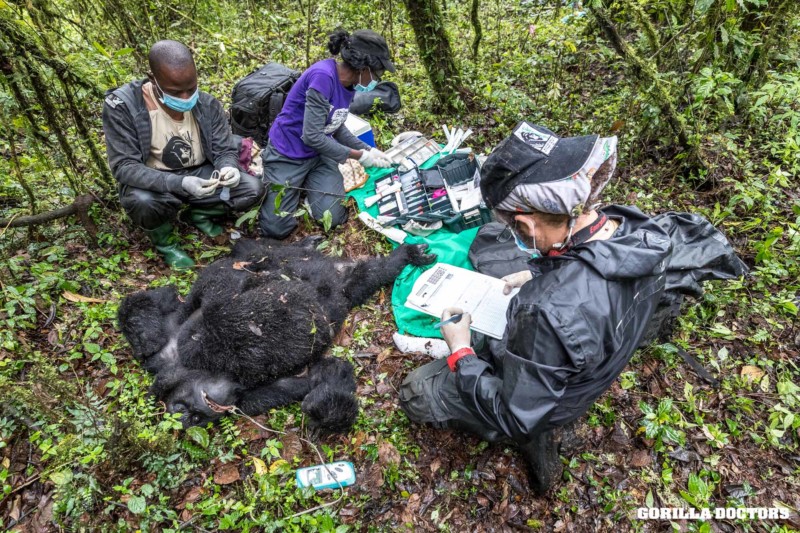Did you Know (Part 1 of 4): Gorilla Doctors + COVID-19
By Gorilla Doctors Staff on Thursday, April 16th, 2020 in Blog.Since the World Health Organization (WHO) declared COVID-19 a pandemic on March 11, 2020, Gorilla Doctors has been reporting on our work to protect the health of the world’s endangered mountain and critically endangered eastern lowland (Grauer’s) gorillas. Our veterinary care is considered an ‘essential service’ by the governments of Rwanda, Uganda and DR Congo and we continue our health checks, monitoring visits and clinical interventions despite all the new logistical challenges our veterinary teams and their family members face (who are all living under travel restrictions and shelter-at-home orders along with the rest of the world).
Gorilla Doctors’ mission is to provide life-saving veterinary care to ill and injured gorillas. This has been our work every day since we first arrived in Rwanda in 1986 at the request of Dian Fossey. This core mission, however, does not reflect the full scope of our work.
Gorilla Doctors is a program that is part of the One Health Institute at UC Davis’ School of Veterinary Medicine (ranked #1 in the world). We use a One Health approach in our work, and have been for the majority of our nearly 35 years as an organization. Our expertise spans the areas of veterinary care, infectious disease and great ape health and conservation.
To provide a deeper dive into these areas, especially as they relate to the current COVID-19 pandemic, we are launching a four-part ‘Did You Know’ series. We hope to provide insight to the full scope of our work, highlighting our efforts to protect the health of endangered mountain gorillas and critically endangered Grauer’s gorillas as well as how our scientific research benefits wildlife health, conservation and pandemic preparedness beyond our gorilla patients.
Part 1: Just the Facts
We begin our series with some definitions and basic facts about Gorilla Doctors and SARS CoV-2, the virus that causes COVID-19 disease in humans.
Gorilla Doctors: The only organization in the world dedicated to providing hands-on veterinary care to wild eastern gorillas in Rwanda, Uganda and DR Congo using science and a One Health approach:
- Science: Gorilla Doctors’ work is based in and informed by science. We conduct scientific research on factors impacting the health of wild gorillas and we partner with leading academic institutions around the world to publish in peer-reviewed scientific journals. This includes our more than 10 years of research and surveillance on pathogens in wildlife that could emerge to cause infectious disease outbreaks in people (to be featured in Part 3).
- One Health: A scientific approach recognizing the health of people, animals and the environments we share are interconnected (to be featured in Part 2). The health of one impacts the health of all. We are witnessing this with the current pandemic, the result of the SARS CoV-2 virus spilling over from wildlife to humans and causing COVID-19 disease.
SARS CoV-2: The name of the virus. When the SARS CoV-2 virus infects a human, the disease it causes is called COVID-19. A person tests positive for SARS CoV-2, not COVID-19.
SARS: S = Severe; A = Acute R = Respiratory; S = Syndrome. SARS CoV-2 is classified as SARS because it is genetically related to SARS CoV-1 from 2003.
COVID-19: CO = corona; VI = virus; D = disease; 19 = 2019, the year the virus emerged.
Novel: A previously unknown or undetected pathogen in an ecosystem.
Pathogen: A bacterium, virus or other microorganism (e.g. fungus) that can cause disease.
Zoonotic disease: Disease in humans caused by a pathogen that originated in animals.
Spillover: When a pathogen ‘jumps’ from animals to humans. While still not proven, SARS CoV-2 is a likely example of zoonotic spillover.
Emerging Infectious Disease: When a pathogen appears in humans or other animals for the first time and causes disease – it emerges from a new source, to infect humans or animals and cause disease.
Personal Protective Equipment (PPE): The protective gear humans wear to prevent the transmission of pathogens. This can include (but is not limited to) masks, gloves, safety glasses, face shields, full body suits.
For more detailed and regularly updated information about COVID-19, visit the UC Davis One Health Institute’s COVID-19 FAQs.
Want to know when we publish Part 2? Subscribe to our blog and receive our newest posts right to your Inbox. On the main blog page, click on ‘Subscribe for Updates’ box just under STAY IN TOUCH and submit your email. We don’t collect your email, this is a service through Google. You will not be added to any other mailing lists.


 Donate
Donate
